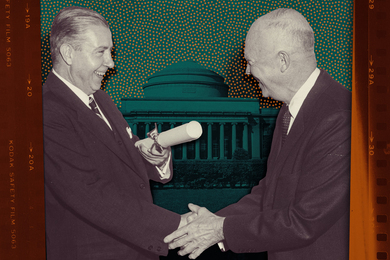Two leading researchers at the Whitehead Institute for Biological Research, Professors Eric Lander and Robert Weinberg, have recently been cited for their work to improve the understanding of cancer.
Dr. Lander, professor of biology and director of the Whitehead/MIT Center for Genome Research, has received this year's Cornelius P. Rhoads Award from the American Association for Cancer Research (AACR) for his groundbreaking contributions to the understanding of the causes of cancer.
The AACR is recognizing, in particular, Dr. Lander's contributions to the analysis of complex traits-those caused by the action of several genes and the environment-and for his efforts in constructing a new linkage map of the mouse genome. These maps provide researchers important tools to dissect complex traits such as susceptibility to common diseases, including cancer. Dr. Lander received his award and spoke at the recent AACR meeting in Toronto.
"I am delighted to receive the AACR Rhoads Award," he said. "The genetic maps of the mouse and the rat will allow us to analyze susceptibility to many common diseases such as cancer, diabetes, hypertension and asthma in animal models of these human diseases."
An expert in mathematics, computers and biology, Dr. Lander is known for his innovative, interdisciplinary approach to biomedical research. He has combined multiple disciplines-biology and mathematics, biology and computer science, biology and history-to answer many biomedical questions.
The Rhoads Memorial Award, established by an anonymous donor, honors Cornelius Rhoads, a founder and first director of the Memorial Sloan-Kettering Institute for Cancer Research.
"Renowned scientist, distinguished researcher, dedicated teacher," were some of the words used to describe Dr. Weinberg as he received the Walker Prize recently at Boston's Museum of Science. Dr. Weinberg, a pioneer in the molecular biology of cancer, is American Cancer Society Professor of Biology and a member of the Whitehead Institute
The award, established 130 years ago by its namesake, recognizes meritorious published scientific invesitgation and discovery. The Walker Prize Committee noted that "his significant discoveries, published in over 200 works, have led to early detection of tumors and to the development of treatments."
Professor Weinberg is at the forefront of efforts to understand the factors that transform normal cells into cancer cells. His recognition that gene transfer techniques might reveal the genetic mechanisms of cancer growth has led biologists to identify dozens of potential tumor-forming genes and has made it possible to understand how cancers originate.
The award was presented by Dr. David Evans, executive director of the Museum of Science, who read from the citation: "Your extensive research and investigation into the molecular biology of cancer have reduced extraordinarily complex phenomena to simpler, universal and relevant truths. you have encouraged scientific inquiry and have exemplified the spirit of investigation and discovery through your life and work."
Previous winners of the Walker Prize have included Institute Professor Emeritus Philip Morrison.
A version of this article appeared in MIT Tech Talk on April 26, 1995.





